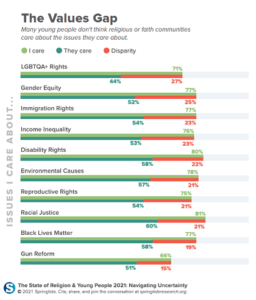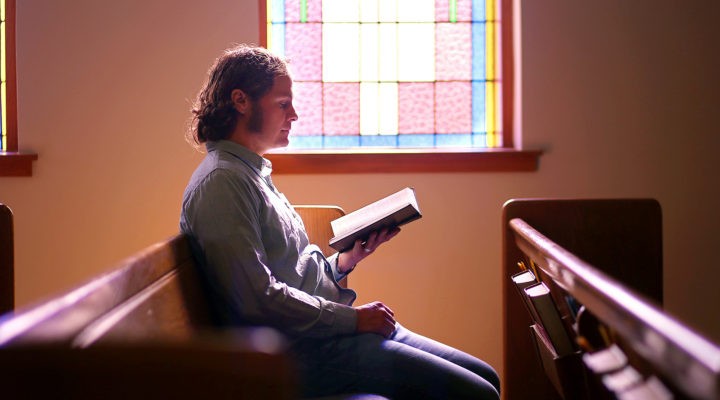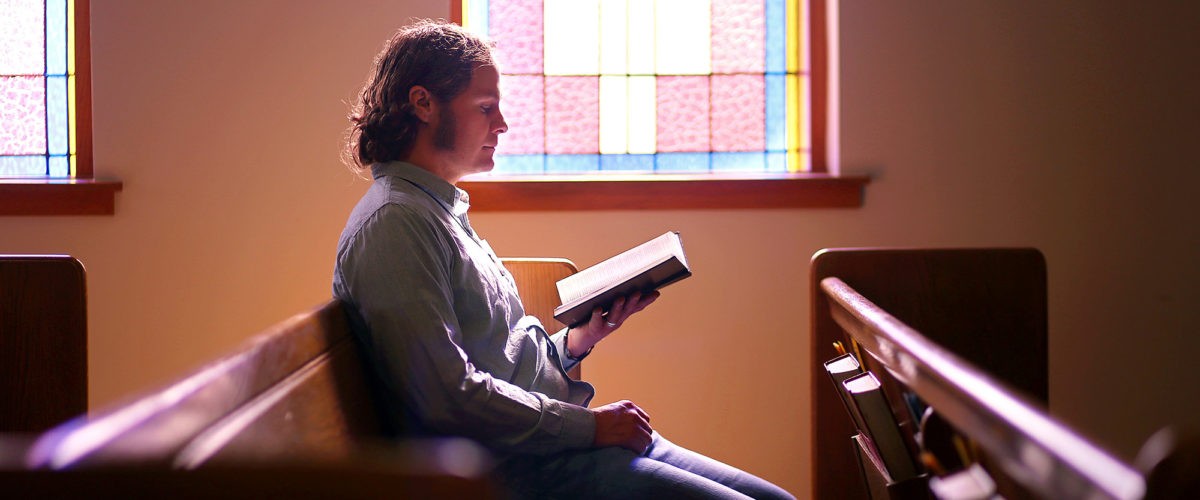Young people in America do not believe churches care about the issues that are important to them — by double-digit disparities — according to a new national survey released today.
Springtide Research specializes in data and resources related to the beliefs, practices, values and relationships of young people ages 13 to 25. Its latest annual survey, “The State of Religion and Young People 2021,” was released Oct. 25, based on 10,274 surveys and 65 follow-up interviews.
On nine contemporary issues that American young people overwhelmingly say they care about, the same young person said they perceive the church cares far less. On every issue, the gap between how much the young people care and how much they perceive the church cares ranges from 15 to 27 points.
LGBTQ rights and gender equality
The biggest gaps are on LGBTQ rights and gender equity. While 71% of young people nationwide say they care about LGBTQ rights, only 44% perceive that the Christian church cares — creating the widest gap of anything on the survey at 27 points.
 On the single issue the larger number of young people say they are about — racial justice — 81% report this as important. Yet only 60% perceive that the church cares about this issue. After more than a year of racial reckoning about police murders of unarmed Black people and Republican-led fear about Critical Race Theory, evangelical Christians in particular have taken the national spotlight in ways that will not attract young people to church, the data show.
On the single issue the larger number of young people say they are about — racial justice — 81% report this as important. Yet only 60% perceive that the church cares about this issue. After more than a year of racial reckoning about police murders of unarmed Black people and Republican-led fear about Critical Race Theory, evangelical Christians in particular have taken the national spotlight in ways that will not attract young people to church, the data show.
Similarly, more than three-fourths (77%) of young people say they care about gender equity, but only 52% believe the church cares. This comes as the two largest Christian bodies in America — the Roman Catholic Church and the Southern Baptist Convention — continue to hold steadfast about women in leadership roles while being embroiled in their own sexual abuse inquiries.
But race, LGBT rights and gender are not the only things young people want churches to care more about. The list includes income inequality, disability rights, environmental causes, reproductive rights and gun reform. On each of these causes as well, young people see America’s faith communities as significantly out of step with their own values systems.
Shunning institutional religion
In keeping with other polling over the past few decades, Springtide’s latest polling finds young people consider themselves religious or spiritual but are turned off by institutional religion.
About three-fourths of 13- to 25-year-olds consider themselves to be at least slightly “religious” or “spiritual.” Yet only 16% say they turn to someone from their faith community when feeling overwhelmed or unsure about something. Even among those who identify as “very religious,” only 40% have found connecting with their faith community to be helpful during challenging or uncertain times.
Even more troubling, nearly half (45%) report they do not feel safe within religious institutions such as churches. And more than one-third (39%) believe they have been harmed by a religious leader in the past.
54% report that “religious communities try to fix my problem, instead of just being there for me.”
Chief among their complaints: 54% report that “religious communities try to fix my problem, instead of just being there for me.”
It’s not just a Christian problem
These gaps do not exist only within young people who have grown up in or whose families are affiliated with Christian congregations. Among young Protestants, 32% said they are not part of any religious community like a church. The same goes for 44% of young Catholics, 44% of young Jews, 44% of young Hindus, 45% of young Latter-Day Saints, and 54% of young Buddhists.
Nationwide and across all faiths, only 23% of young people told Springtide they attend religious services on at least a weekly basis. As previously reported, only 10% of young people said a faith leader reached out to them personally during the first year of the pandemic.
While religion demographers have warned for years that younger generations are growing more and more disaffected with the church, few churches have successfully changed their views or their priorities to address the gap. The most successful megachurches reaching young people go after the most conservative segment of that demographic.
Faith unbundled
Springtide uses a new term to describe the religious attitudes of today’s young people: “Faith unbundled.”
“When we describe faith as unbundled, we mean that religious young people are not relying on a single religious tradition or organization to form and inform their beliefs and practices. Instead, they mix together things from various traditions, religious and otherwise,” the Springtide report explains.
“Young people with unbundled faith will partake in religion, including practices, beliefs and communities, to the degree that suits them, with no formal or permanent commitment.”
Think of this like the streaming music services Spotify or Pandora, the report adds: “A person can enjoy specific tracks without buying the whole album. Someone can create their own playlists by ‘unbundling’ a variety of albums and ‘bundling’ songs from these many albums and artists to their liking rather than the musician’s original grouping.”
The bottom line, then, is this: “Young people with unbundled faith will partake in religion, including practices, beliefs and communities, to the degree that suits them, with no formal or permanent commitment.”
For example, Springtide found more than half of young people (53%) say, “I agree with some, but not all, of the things my religion teaches,” and, “I don’t feel like I need to be connected to a specific religion” (55%).
Thus, rather than buying into the prepackaged belief systems of religions or denominations or individual congregations, they mix and match and construct their faith.
Springtide reports that American young people “are no longer religious in the traditional sense.”
How young people are bundling religious practices
This new portrait of faith in younger America includes these elements:
- Young people are more likely to engage with art as a spiritual practice (53%) than prayer (45%).
- Young people are more likely to engage in yoga and martial arts as a spiritual practice (40%) than attend a religious group (25%).
- Young people are more likely to practice being in nature (45%) or meditation (29%) as spiritual practices than study a religious text (28%).

Josh Packard
“It is abundantly clear from these data that the goal (for churches) is to stay in the conversation with young people for as long as possible. They are exploring everything, asking questions constantly and looking for guidance, but they’re not going to accept a pre-made faith or religious system,” said Josh Packard, executive director of Springtide.”
None of this should come as a surprise, added Casper ter Kuile, author of The Power of Ritual. “Just as gender expressions, sexualities and racial identities are now understood on a richer spectrum and grounded in intersectionality, young Americans are reimagining religiosity, spirituality or faith as something that opposes a stark ‘in’ or ‘out,’ ‘this’ or ‘that’ way of compartmentalizing,”
Related articles:
42% of young people say no one outside their home has reached out to them during pandemic
Young adults say churches key in battle against climate change, poverty and corruption


